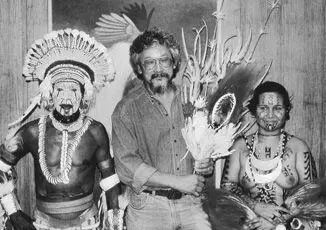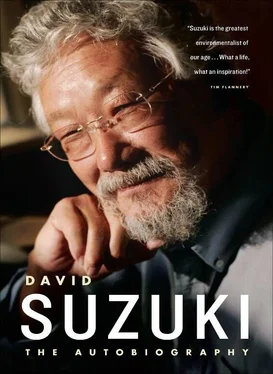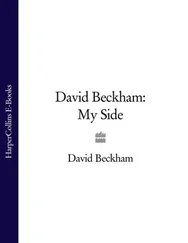Kuru was transmitted primarily to children and women, who tended to be given the highly infective brains to eat while the men ate the preferred muscles, which carried far fewer of the causative agents. Christianity had ended the cannibalism and intertribal wars, and although I didn't like the way the religion had come to dominate Papua New Guinean cultures, it was hard to decry the abolition of the killing.

Party greeting me at the airport in Port Moresby, Papua New Guinea
Nick had arranged for Indigenous Environment Watch, a group of native and nonnative environmentalists, to issue a formal invitation, which I immediately accepted, and the next time I was visiting Australia I flew in to Port Moresby, the capital of Papua New Guinea. When my plane landed and taxied toward the terminal, I peered out to see a crowd of children holding up flags and a large sign of welcome. “Must be a politician or someone important,” I remarked to my seatmate.
Imagine my surprise when the plane stopped and I saw that the sign said “Welcome Doctor Suzuki”! As I walked from the plane to the airport terminal, a man painted yellow and wearing an elaborate feather headdress, boars' teeth piercing his nose and hanging from his neck, and a grass skirt, and a bare-breasted woman who was also elaborately painted, greeted me and, dancing, led me to a room where I was waved through customs without a question. Then I was led to a car and whisked into town. Wow, wish I were met like that everywhere. It was just a hint of what was to come.
Papua New Guinea had been claimed by a succession of countries during the colonial period of the nineteenth century, from Holland and Britain to Germany and Australia, and received full independence from Australia only in 1975. Real European contact with the establishment of permanent European outposts and diplomatic relations goes back little more than a century, and many tribes had been contacted by white people only within the past few decades. In Port Moresby, I met an anthropologist named Nicholas Faraclas, who had worked and taught at the University of Papua New Guinea for many years. He has a great affection for the people and in 1997 wrote one of the most powerful pieces about them that I've read. Here is part of what he said:
Imagine a society where there is no hunger, homelessness or unemployment, and where in times of need, individuals can rest assured that their community will make available to them every resource at its disposal. Imagine a society where decision makers rule only when the need arises, and then only by consultation, consensus and the consent of the community. Imagine a society where women have control over their means of production and reproduction, where housework is minimal and childcare is available 24 hours a day on demand. Imagine a society where there is little or no crime and where community conflicts are settled by sophisticated resolution procedures based on compensation to aggrieved parties for damages, with no recourse to concepts of guilt or punishment. Imagine a society. . in which the mere fact that a person exists is cause for celebration and a deep sense of responsibility to maintain and share that existence.
Such a place is not fiction, says Faraclas:
When the first colonisers came to the island of New Guinea, they did not find one society that exactly fit the above description. Instead, they found over one thousand distinct language groups and many more distinct societies, the majority of which approximated closely the above description, but each in its own particular way. These were not perfect societies. They had many problems. But after some one hundred years of “northern development”. . nearly all of the real developmental gains achieved over the past 40,000 years by the indigenous peoples of the island have been seriously eroded, while almost all of the original problems have gotten worse and have been added to a rapidly growing list of new imported problems. (“Critical literacy and control in the new world order,” in Constructing Critical Literacies , edited by Sandy Muspratt, Allan Luke and Peter Freebody)
Nick Fogg had arranged for me to be flown to remote areas in the mountains and on the coast to meet people who were living traditionally but were under threat from illegal logging of their land. After staying overnight in Port Moresby, I was flown up into the mountains to Kokoda, where we landed on a grassy field. When the plane taxied to a stop, we were surrounded by a group of men wearing full body paint and spectacular regalia festooned with feathers, shells, and pigs' tusks. I was taller than all of them, but two of the men grabbed my legs and lifted me up on their shoulders. I was taken totally by surprise, and as I tried to twist upright, I threw my back out. I had a camera hanging around my neck and tried to get it into position as I struggled to stay upright without making my back hurt worse.
These two fellows were unbelievably strong and ran — not walked fast, ran — sweating and grunting as the others running along with us drummed and sang. I was bouncing up and down, feeling very, very uncomfortable, suffering jolts of pain up my spine while also trying to take pictures of this unique experience. The men ran all the way to a village about half a mile away, never once indicating I was too heavy or stopping for a rest. It was a wonderful relief to be put down.
In the village was a large outdoor stage where people gathered for meetings and entertainment. An elaborate dance with drumming and singing was performed for me, and then speeches were given in pidgin, which Nick translated for me. The people understood what the logging of the forest meant, a loss of their identity and traditions, but they also needed money for medicine and clothing like T-shirts and shorts. I gave a speech about what was happening around the world and how precious the forest was to this community. I emphasized that the people must retain control over their land and develop a community economic strategy that would allow them to generate an income without destroying their surroundings. I gave the speech in sentences that Nick translated into pidgin. The speech seemed to go over well, and I stayed overnight in a structure that was built above the ground on posts. Even there, what was impressive was the commonality of our humanity — these were people with whom I could laugh, eat, and communicate — yet I couldn't imagine the way they looked out at the world; culturally, it was as if we came from different parts of the universe.
Nick had arranged for a visit to a series of remote villages, which we reached by boat, plane, or jeep. Each village I visited entertained me with performances and plays the people had made. One play portrayed the arrival of Europeans, and the caricatures of the aliens were sidesplittingly funny. The performers were dressed in homemade costumes, and the white man was depicted as a clown, ordering the locals around and not having a clue about the tricks being played on him. I found it hilarious that the pompous visitor was so full of his own self-importance while the Papua New Guineans simply humored him, knowing he was a fool.
In one village, the inhabitants lined up to greet me after I had passed through a gate made of branches and leaves, signifying I had been welcomed onto their land. I shook hands along the line until I reached a young man who was covered from head to foot with what looked to me like a white fungal growth. I took a deep breath and shook his hand, assuming that whatever it was on his body must not be readily transmissible or he wouldn't have been there. Fortunately, my hand didn't develop any tropical rot and fall off.
Читать дальше



![David Jagusson - Devot & Anal [Hardcore BDSM]](/books/485905/david-jagusson-devot-anal-hardcore-bdsm-thumb.webp)









